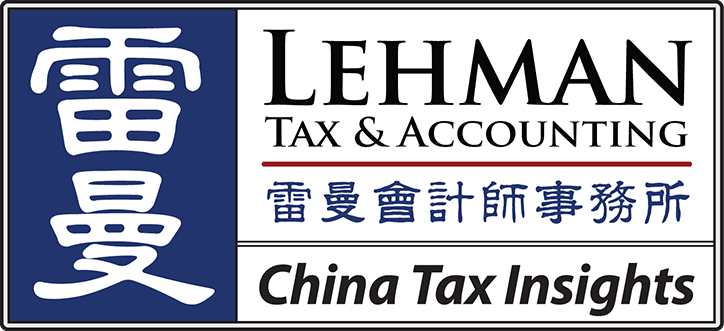

|
|
|
|
LEHMAN, LEE & XU
|
|
April 2010
|
|
|
| Free Trade Zones ("FTZs"), Export Processing Zone ("EPZs") and bonded logistics park |
|
Customs duty and VAT are two major concerns to foreign investors doing business in China. A clear understanding of the relevant tax implications is a necessary when operating in China.
Often bonded goods are used in the manufacturing process; their Customs duty and VAT obligations vary depending on the usage and its final destination: In Summary:
|
|
|
| Zhangye Tengda Metal Co., Ltd |
|
In December 2008, the tax bureaus of Gansu Province and Zhangye City
investigated the Zhangye Tengda Metal Co., based on information forwarded
from other government bureaus. The local and provincial tax bureaus established
a task force with the local police departments to carry out the investigation.
The investigation showed that since March 2006, the criminal suspects
Cui Xinge and others has established the Zhangye Tengda Metal Co., Ltd.,
the Zhangye Hongye Scrap Metal Recycling Co., Ltd. as well as six other
companies. These companies were established by using the identities of
10 disabled persons to set up the companies as well as act as the companies
Legal Representatives and Shareholders. It was proven that the companies
had never engaged in the buying or selling of scrap metals, or processing,
manufacturing or selling metal materials, yet had issued 328 counterfeit
VAT invoices which were sold to 66 companies in Beijing, Tianjin, Hebei
and other six provinces (cities). The 328 invoices were sold for RMB 188.4
million (US$ 27.64 million) which allowed the 66 companies who purchased
the fake invoices to evade tax in the amount of RMB 220.44 million ($
32.35 million).
|
|
|
| Reduction of VAT rates to be expanded in 2010 |
|
Chinese Premier Wen Jiabao recently pointed out in his government work report that the government will continue to do the transformation of value-added tax. It can be expected that the VAT reform that began on January 1 of last year will play a greater role in 2010 Data has shown that the annual deducted amount of tax in 2009, since the implementation of the VAT reform is about 140 billion Yuan. This means that the taxes levied on enterprises have been effectively reduced. Since the second half of 2008, China has raised the export rebate rate of some industries and products eight times in succession, optimized the export rebate process and sped up the export rebate progress, which has not only stabilized export industries, but also increased the confidence of enterprises when China's economy was facing extreme difficulties. Although the one-year VAT transformation has laid the foundation for
the economic recovery, further reform are anticipated. The current VAT
transformation only allows enterprises to offset the original equipment
cost in the fixed assets investment, so the plant construction cost accounting
for up to 62% cannot be offset. The future VAT transformation will also
continue by "expanding tax bases and reducing tax rates" to incorporate
more industries in the scope of taxation, and appropriately relax the
tax cut standards, which is supplemented by appropriately reducing tax
rates. It is also planned to eventually replace the sales tax with the
value-added tax. Taxes paid in the service industry in which the sales
tax and the value-added tax are concurrently collected will be reduced.
|
| China to introduce resource tax at 'proper' time |
|
China will introduce resource tax at a "proper" time to promote energy saving and environmental protection, the Ministry of Finance said Tuesday in a statement on its Website. The statement provide little details about the move which is part of the ministry's tasks for 2010 listed in the lengthy statement. The government would stick to the proactive fiscal policy this year, the statement said, adding the ministry would expand investment in agriculture, education, science, medical care, social security, affordable housing, energy conservation and emission reduction. The ministry said it would improve the property tax system, without details. It would also step up efforts to revamp income distribution, aiming at narrowing the yawning wealth gap.
|
|
|
| Newsbites | |
|
Study on the collection of social
security tax
|
SAT Clarifies Matters On Tianjin
Pilot Project For Export Rebate In Finance Leasing Of Vessels
|
|
SAT Clarifies Deed Tax Policy
For First-Time Common Housing Purchasers
|
Re-Employment Tax Policies For
Unemployed Residents Extended
|
|
SAT Specifies Tax Policies For
Special Funds Of National Movie Industry
|
New Tax Collection Agreement
Beneficial to Trade Between China And Indonesia
|
|
Preferential Tax Policies For
Sports Industry Will Improve
|
Provisional Measures For Taxation
Of Permanent Representative Offices Of Foreign Enterprises
|
|
Stamp duty news pulls down market
|
Household-Based Personal Income
Tax Policy Subject to Research
|
|
Small low-profit enterprises
will be levied income tax by half this year
|
A tax administrative reconsideration
authority shall not charge any fee for accepting an application for administrative
reconsideration from an applicant since April 1
|
|
State Administration of Taxation
Clarifies On Eight Issues Regarding Enterprise Income Tax
|
SAT Requires Wide Dissemination
of Individual Income Tax Policies Concerning Transfer of Non-tradable
Shares
|
|
Reduction of VAT rates to be
expanded in 2010
|
SAT Clarifies Export Tax Refund
& Exemption In Border Areas
|
|
State-Owned Assets Supervision
And Administration Commission Suggests Extravagant Profit Tax On Real
Estate Industry
|
Development of low-carbon economy
needs the support of fiscal and taxation policies
|
|
|
|
|